Organicism
Well it appears that I've been MIA for the past couple of days and that would be because I've been working on pieces for an exhibition at Columbia College in Chicago. This will probably consume my life for the next couple of weeks so apologies to everyone whom I neglect to stay in contact with. As my professors recently said...you need to live and breath art, bleed art, sweat art, and poop art, everyday.
I'm so passionate about this show because it's finally the perfect venue for my natural sculptures (circa Summer 2005, North Cascades). A friend of a friend came across said website (www.umich.edu/~mtliang) and in organizing the exhibition, asked me to create some new works. He even used a previous work for the exhibition poster:
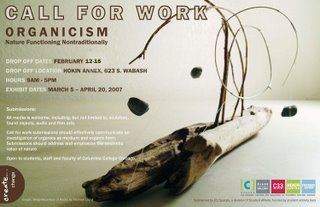
Nothing makes you feel like a valid and professional artist like seeing your work on a poster.
After many many weeks of brainstorming and sketching, I finally went out to buy/harvest my supplies this weekend. And after several hours in my room (chunks of time that are frankly, quite hard to come by as a full-time student), I produced two new pieces. I'd like to create as many as I can, but would be satisfied with six or seven.
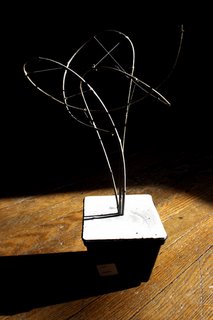
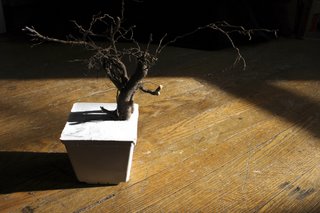
The idea for this series is the Urban Garden; given the challenge of using natural material in the dead of winter in an urban setting, this seemed appropriate. I'm trying to see what new forms I can create, permanent plants forms that don't need any watering or care (especially since I have nothing close to a green thumb). They are held in square blocks of plaster to reinforce the urban/concrete landscape that they are to be exhibited in as well as contrast the organic flowing forms of the sculptures.
My current issue is whether or not to keep the black plastic pot. Unfortunately, the plaster isn't too strong and upon removal of the plastic mold, corners often break off. So the black plastic provides a smoother finish and visual contrast to the white plaster (especially if they're presented against a white background), but it just doesn't have the same physical weight as the plaster block. Any thoughts or suggestions? Oh, and I'm using photographs of these for my All Student Exhibition piece (very structured documentation...black and white, white seamless background, shallow depth of field, etc, etc. Something scientific...)
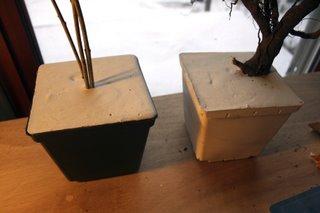
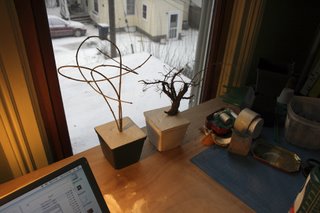
And if you're still interested, here's the Organicism write-up:
ORGANICISM
Nature Functioning Nontraditionally
With the urban scape rapidly expanding up and outward into the natural environment, organic form and material is being overcome. Calls to action for environmental welfare are abundant and often in the name of preserving nature for its functionality as a system. While the natural environment is unquestionably very important and while the decline of its state is, as it should be, a chief concern, it is essential to not forget that nature fills the dual-role of both form and function.
The concept embodied in the work showcased as Organicism is the celebration of all that naturally occurring for the sake of aesthetic and personal experience. Instead of artists making proclamations of distress, each is examining who they are in relation to how they experience organic form and material. Organicism will provide a multi-sensory account of these complex relationships with nature; relationships that have gone beyond the bounds of understanding nature in terms of it existing merely to function.
The term organicism comes from a scientific philosophy that suggests that the whole cannot be defined by the sum of its parts; that the system is important above its components. In this context, Organicism manifests the exact opposite. Metaphorically, Organicism: Nature Functioning Nontraditionally is an exploration not of why leaves on a tree or why trees in a forest are organized they way that they are, but is instead that of how the intricacies of an individual leaf can be just as appealing to the senses as the entire forest.
Organicism: Nature Functioning Nontraditionally is curated by Columbia College student Tannar Veatch, an art and design major with concentrations in the fine and media arts.

0 Comments:
Post a Comment
Subscribe to Post Comments [Atom]
<< Home